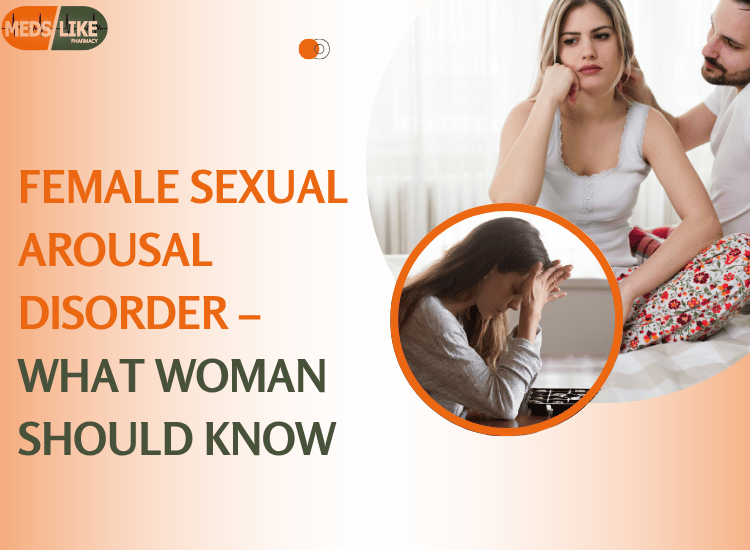Female Sexual Arousal Disorder (FSAD) is a condition that affects a woman’s ability to become or stay sexually aroused during sexual activity. While male sexual dysfunction is widely discussed and openly treated, FSAD often remains in the shadows due to social stigma, lack of awareness, or the misconception that it’s “all in the head.” But the reality is clear—FSAD is a genuine, treatable medical condition, and understanding it is the first step to regaining sexual well-being and personal confidence.
What is Female Sexual Arousal Disorder?
FSAD is categorized as a type of Female Sexual Dysfunction (FSD), specifically involving a persistent or recurrent inability to attain or maintain sufficient sexual arousal. This lack of arousal can manifest physically, such as reduced genital lubrication and blood flow, or emotionally, such as decreased interest or excitement during sexual encounters.
It is important to note that FSAD differs from low sexual desire (hypoactive sexual desire disorder). In FSAD, the desire for sex may still be present, but the body does not respond as expected.
Common Symptoms of FSAD
Every woman experiences sexual arousal differently, but some common signs of FSAD include:
- Difficulty becoming or staying aroused during sexual activity
- Limited or absent vaginal lubrication
- Reduced genital swelling or sensitivity
- Inability to achieve sexual satisfaction
- Feelings of frustration or distress about sexual performance
- Strained relationships due to lack of intimacy
These symptoms can occur occasionally or persistently. If they last for six months or longer and cause significant personal distress, a medical diagnosis of FSAD may be considered.
What Causes Female Sexual Arousal Disorder?
FSAD can stem from a variety of physical, psychological, and relational factors. Understanding the root cause is essential to finding the right treatment.
1. Hormonal Imbalances
Estrogen plays a key role in female sexual function. Drops in estrogen levels—common during menopause, after childbirth, or due to medications like birth control pills—can affect vaginal lubrication and sensitivity.
2. Medical Conditions
Chronic illnesses such as diabetes, cardiovascular disease, neurological disorders, and thyroid imbalances can affect blood flow and nerve function, both of which are critical for arousal.
3. Mental Health Issues
Anxiety, depression, stress, or past trauma (such as sexual abuse) can significantly interfere with sexual responsiveness. Performance anxiety or body image issues also contribute to FSAD.
4. Medications
Certain antidepressants (SSRIs), antihypertensives, and other drugs may reduce libido or impair arousal. Women often experience FSAD as a side effect of such medications.
5. Relationship Factors
Emotional intimacy, communication, and trust play a major role in female arousal. Conflicts, lack of connection, or dissatisfaction with a partner can suppress the body’s arousal response.
How is FSAD Diagnosed?
Diagnosing FSAD typically involves a thorough evaluation by a healthcare provider, which includes:
- Medical and sexual history
- Psychological assessment
- Pelvic examination
- Blood tests to check hormone levels or rule out underlying health issues
It’s important to be honest during these evaluations. Although talking about sexual health can be uncomfortable, it’s a critical step toward treatment and healing.
Treatment Options for FSAD
The good news is that FSAD is treatable, and women have several options depending on the cause and severity of the condition.
1. Hormone Therapy
For women experiencing FSAD due to menopause or hormonal imbalance, estrogen therapy (topical creams, rings, or tablets) or androgen therapy (testosterone supplementation) can improve blood flow and vaginal lubrication.
2. Lubricants and Moisturizers
Over-the-counter vaginal lubricants can provide immediate relief from dryness, enhancing comfort and pleasure. Vaginal moisturizers used regularly help maintain natural moisture.
3. Sex Therapy and Counseling
Psychosexual counseling can help women and couples explore emotional or psychological barriers to intimacy. Therapy provides a safe space to discuss past trauma, relationship concerns, or performance anxiety.
4. Lifestyle Modifications
Exercise, stress management, and maintaining a healthy diet can all contribute to improved sexual health. Reducing alcohol intake and quitting smoking can also enhance arousal by improving circulation.
5. Medication
FDA-approved medications such as flibanserin (Addyi) or bremelanotide (Vyleesi) may be prescribed for women with certain types of sexual dysfunction. Although not specific to FSAD, they may help in cases involving reduced sexual interest or arousal.
6. Pelvic Floor Physical Therapy
For women with tight or weak pelvic muscles, targeted exercises can improve blood flow and sexual response. Physical therapy may also address pain or discomfort during intercourse.
Emotional and Relationship Support
FSAD often leads to frustration, guilt, or shame—not only for the woman but also for her partner. Open, non-judgmental communication is essential. Seeking therapy as a couple may help bridge emotional gaps and reignite intimacy.
Partners should understand that arousal issues are not a sign of rejection or lack of love. With support and understanding, couples can explore new paths to sexual connection and mutual satisfaction.
When to See a Doctor
If you’re experiencing ongoing difficulties with sexual arousal that affect your well-being or relationships, it’s time to consult a healthcare provider. Don’t wait until the problem becomes overwhelming. Early intervention improves outcomes and helps preserve quality of life.
Empowerment Through Knowledge
FSAD is not a reflection of your worth or womanhood. It’s a medical condition, just like any other, and it deserves proper attention and care. Too many women suffer in silence, thinking that arousal issues are “normal” or untreatable. But with the right help, healing is possible.
Empowering yourself with information, advocating for your sexual health, and seeking compassionate care can make all the difference. Every woman deserves a satisfying, fulfilling sex life—free from shame, pain, or confusion.
Final Thought:
Your sexual health is an essential part of your overall well-being. Don’t ignore it. Whether you’re navigating hormonal changes, mental health concerns, or relationship challenges, know that FSAD is treatable—and you’re not alone on this journey.

